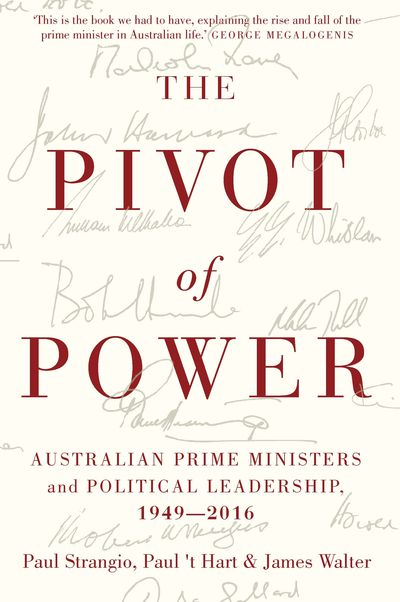←Back to The Pivot of Power

An extract from “The Pivot of Power”
‘There has never been a more exciting time to be alive than today and there has never been a more exciting time to be an Australian’, Malcolm Turnbull enthusiastically proclaimed upon becoming prime minister in September 2015. His optimism appeared to be contagious. The electorate responded buoyantly to the removal of Tony Abbott and his replacement by Turnbull. Having cited the Coalition government’s dire unpopularity under his predecessor’s leadership as a core motive for challenging Abbott, Turnbull was able to bask in the latter months of 2015 in the glow of opinion polls showing that the government had surged ahead of the Labor opposition, and in dizzying ratings for his own performance. It did not last.
By 2016, the Australian Election Survey revealed that trust in government had reached an all-time low of 26 per cent; 74 per cent of respondents believed that people in government looked after themselves; and only 12 per cent thought government was run for ‘all the people’, while 56 per cent thought it served ‘a few big interests’. Perhaps most intriguingly, a subsequent survey seemed to confirm a latent messiah complex within the electorate. It reported that 70 per cent of Australians believed ‘the nation needs a strong leader to take the country back from the rich and powerful’, and that Australians emerged as more likely than most to support closing the door on globalisation. These trends were worldwide, but it was striking that Australians, who suffered less than most, were more disenchanted than the global average, indicating that something more than shared problems was in play.
At times of crisis or deep disillusion, there is typically a call for strong leadership—and Australians have registered just such a plaint in polls published at the time of writing. There has been no dearth of strong leaders (Menzies, Fraser, Howard) and aspirant strong leaders (Abbott), and we have acknowledged their achievements. But their limitations are also apparent: a conviction that they must take everything on themselves (Fraser); a tendency towards cognitive closure in the face of complex problems that require flexibility (Abbott); encouragement of inner circles that may encourage groupthink (Howard); and a possible leaning towards role-induced hubris (Menzies and Howard, for all their acquired self-control and political astuteness, overreaching in policy fiascos such as the Suez intervention, the Iraq War and WorkChoices).
There is now a considerable critique of ‘the myth of the strong leader’ along with equally rich research that demonstrates the value of ensemble approaches to multifaceted social problems. Our study has shown that the complex challenges of social change have been best addressed by prime ministers who have fostered just such talented ensembles, capable of applying diverse skills to the task. The standout instances have been Alfred Deakin (with a rare capacity for attracting disciples and crafting alliances), Curtin and Chifley (united in cooperative endeavour by robust common sense allied with personal humility), and Hawke (who improbably matched overweening egotism with an inherent gift for orchestrating distributed leadership). In each case, they operated at the turning point of a political cycle: Deakin inaugurating ‘the Australian settlement’, Curtin and Chifley initiating ‘Australia’s boldest experiment’, and Hawke (with Keating) instigating the reform cycle that assured prosperity and resilience as globalisation disrupted Australian expectations. It perhaps seems a vain hope to trust in the wisdom or capacity of the right individuals simply to emerge again, but in the past, difficult circumstances have conspired to produce them. And the prime ministership has been a hardy and adaptable institution. It might yet prove so again.
This is an edited extract from The Pivot of Power: Australian Prime Ministers and Political Leadership, 1949-2016.